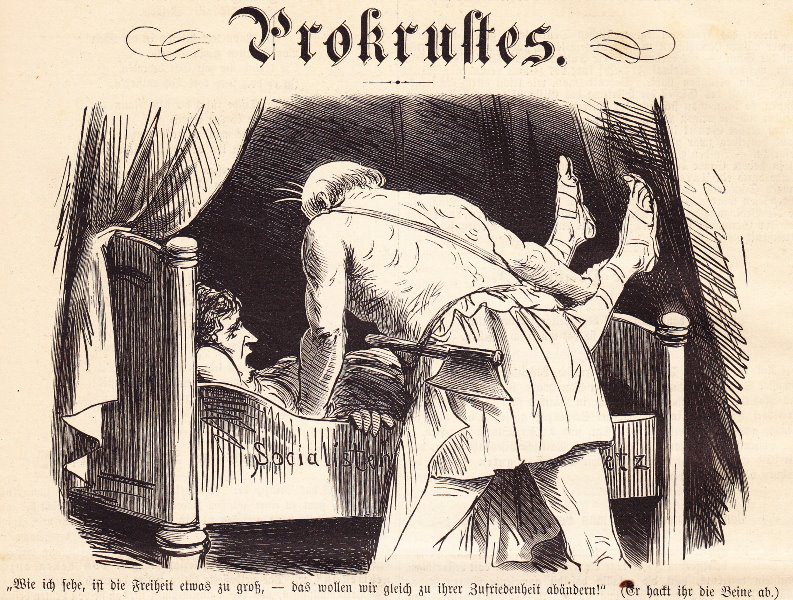Image source: http://freisinnige-zeitung.de/archives/8094
The Procrustean bed is a Greek myth about a rogue innkeeper who force-fitted people on an iron bed by either stretching or amputating them. It has often been used as a sharp metaphor for bad policies designed to solve constructed or evident problems. Calling a principle procrustean implies that it imposes an arbitrary standard of uniformity on its subject(s), irrespective of the harmful consequences of such application. The metaphor finds precedent, for instance, in Thomas Jefferson’s Notes on the State of Virginia, where it was used to assert that the difference of opinion was advantageous in religion, and conformity undesirable.
One may think of present-day censorship-oriented politics over the scope of free speech in these terms. In 2020, the Knight Foundation released a survey of American college students’ views on free speech and inclusivity. It revealed the tensions playing out in their minds vis-à-vis the value of free speech, the need for safe spaces, which sets of ideas they prefer to be exposed to, the deteriorating condition of discourse online, and the future of the American First Amendment that sustains freedom of speech. The survey found that a central tradeoff for students existed between free speech and inclusivity. We might not be able to take this as a given but it certainly merits further discussion. At the very least, it can be considered a provocation to test the current perception of constitutional rights. But do we need to perceive preserving our freedoms and being inclusive as competing and contradictory needs?
In 2019, I wrote an essay on how the grain of human rights must be separated from the chaff of dense rhetoric. This is especially true for Western university campuses, which have become ground zero for frequent calls for censorship of free speech. This may be due to the fact that these sites are melting pots of cultures, beliefs, attitudes, and preferences. However, this is not the full story. Picking up on the possible causes of the general polarization across groups in the population, more insight into why such rhetoric emerges can be unearthed. For example, there are more rewards now for polarization and shock-value in the market for ideas. Social media algorithms are a great engine for this. Such incentives shape the production of increasingly extreme, convoluted, and decontextualized viewpoints. In fact, this has been likened to a competition over positional goods, which are tied to one’s status in a social hierarchy.
These new logics are internally inconsistent: they discourage introspection, weaponize history and lived experience, generalize selectively and subjectively, and are motivated towards gathering likes, comments, tweets, and shares. They symbolize superficial aspirations for stature, and fight their ideological battles over profitable terrain, rather than with an ear to the ground, improving institutions and uplifting those in need. The very fact that they encroach upon natural freedoms for sustenance is a dead giveaway. With the appearance of such norms then, it becomes crucial that we go back to the history of liberalism to ground popular discourse in civility.
In The Struggle For A Better World, Peter Boettke holds up to light the classical liberal way of thinking, a tradition that traces its roots to Adam Smith. In doing so, he also shows how the transformed liberalism of today can scarcely hold a candle to the liberalism of yesteryear which fought tyranny and subjugation. While Boettke’s discussion largely revolves around political economy and its disciplinary practice, it is prescient on the topic at hand. They are faux liberals who think that the political struggle ought to exist solely in the realm of language. Demonizing speech (and its instrument) per se is an abandonment of civil discourse. Instead of testing prevalent notions in a spirit of inquiry, this declares our very efforts to do so hollow. Hence the demand for unconditional condemnation, de-platforming, and virtue policing.
As far as political correctness is concerned, a recent philosophical study shows that critical postmodernists and Enlightenment liberals are two sides of the same coin. Their political mechanism is the same, with the core debate being “about the type of politically correct regulation that can better guard liberal values.” Historically speaking, the US Founding Fathers construed natural rights in a very different way from today. In their view, rights like free speech were defined and refined not by the judicial authority, but through the people and their representatives. This implies that civil discourse is an essential vehicle for advancing the larger social ethic. But policing through legal or administrative force what one considers ‘objectionable’ is counterproductive because it jumps from the civic sphere to the sphere of authoritarian exercize.
Bad ideas ought to be fought off from within through the virtues of civility. Administrative fiat under one kind of pressure or another is an authoritarian solution to this organic process. It may be said that a contestation over ideas in the social sphere is invariably underpinned by a struggle for power. But it would be a fault to allow the latter to completely subsume the nature of collective inquiry. Nat Hentoff once said, “Whenever I see that kind of story, where everybody agrees, I know there’s something wrong.” Normative agreement is not an aspirational virtue for humanity. Nor is it even humanly possible, since out of the crooked timber of humanity no straight thing was ever made.
Note: This essay was among the top four finalists of the 2022 Nat Hentoff Award for Free Speech given by the Cato Institute.
This piece solely expresses the opinion of the author and not necessarily the organization as a whole. Students For Liberty is committed to facilitating a broad dialogue for liberty, representing a variety of opinions.






